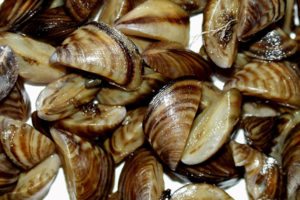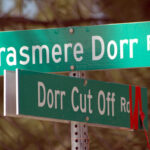Home »

Ongoing funds for Invasive Mussel Defence Program
For the first time, the Government of British Columbia is ensuring there will be dedicated, significant annual funding for B.C.’s Invasive Mussel Defence Program, to help protect the province’s waterways from the environmental, economic and social impacts these invasive species can have.
“It’s imperative that we keep these destructive species out of our province, and not allow them to threaten our vibrant B.C. waterways,” said George Heyman, Minister of Environment and Climate Change Strategy. “This is why we will be funding the Invasive Mussel Defence Program on an annual basis, to ensure that necessary and responsive resources are in place to protect our economy, our infrastructure and our sensitive ecosystems.”

The presence of zebra and quagga mussels could harm fish populations and sensitive ecosystems, as well as impact water supplies and tourism. The defence program is designed to prevent the spread of these mussels by intercepting and inspecting watercraft travelling into or through B.C.
“The Invasive Species Council is pleased to see the ongoing investment by government in the mussel prevention program,” said Brian Heise, chair of the Invasive Species Council of B.C. “The ISCBC looks forward to working with experts, volunteers, governments, industry, regional committees and other partners throughout B.C. to prevent the introduction of invasive mussels into our vital fresh waters.”
B.C. has 12 inspection stations at key entry points to determine whether vessels entering the province are at high risk of carrying the invasive mussels.
The B.C. Conservation Officer Service (COS) is leading enforcement operations, and has 64 trained auxiliary officers. The COS also has a trained dog, Kilo, to help detect possible invasive mussels on high-risk vessels. In his first year, Kilo was on shift for over 900 inspections, and detected invasive mussels on two contaminated watercraft. Kilo will be joined in the 2019 season by K9 Major, the program’s second canine officer.
The public is encouraged to report any watercraft suspected of transporting invasive mussels to the B.C. Conservation Officer Service’s Report All Poachers and Polluters (RAPP) hotline at 1 877 952-7277.
Annual funding to the Invasive Mussel Defence Program includes:
* BC Hydro – $1.25 million
* Columbia Basin Trust – $250,000
* Columbia Power – $250,000
* Fortis BC – $250,000
* Ministry of Agriculture – $200,000
* Ministry of Environment and Climate Change Strategy – over $1.75 million annually, including a $1 million budget.

Quagga and zebra mussels have been found in all provinces east of Saskatchewan, and dozens of states in the United States.
In 2017, 400 samples from just over 100 British Columbia lakes were analyzed, and all came back negative for invasive mussels.
The Controlled Alien Species (CAS) regulation under the Wildlife Act makes it illegal for a person to possess, transport or allow any prohibited invasive mussels to be released or escape into B.C. waters. The Invasive Mussel Defence Program works closely with the Canada Border Services Agency, which provides reporting on watercraft entering Canada along B.C.’s southern border.
In 2017, 35,500 watercraft were inspected, 2,071 of which were considered high-risk, and 270 decontamination orders were issued in 2017, as well as 200 quarantine periods, while 25 mussel-fouled watercraft were intercepted in 2017. The program received advanced notification from another jurisdiction on 20 of these 25 mussel-fouled watercraft.
For the 2017 season, 59 tickets and 86 warnings were issued by conservation officers to motorists for failing to stop at inspection stations.
Through partnership with the Ministry of Transportation and Infrastructure, the program is launching new watercraft inspection signs for the 2018 season (which commenced April 1). The signs have been designed to improve visibility and awareness for motorists transporting watercraft.
More about the invasive mussels defence
e-KNOW







